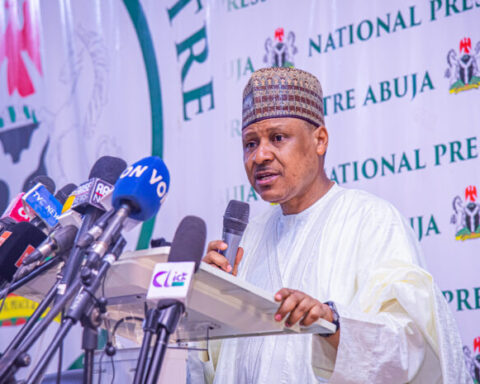The recent family statement announcing the celebration of the life and times of the legendary monarch, Igwe Osita Agwuna III noted that a man deserves his praise. The statement signed by Chukwudinigbo Agwuna, Nkpume Azaokù, implored every good meaning son of Igbo land to appreciate the great contributions of HRM Igwe Osita Agwuna III towards the development, upliftment, and patriotic services to his community as the Eze Enugwu Ukwu na Igwe Umunri for fifty years.
It stated that during this period, this symbol of greatness interpreted, defined, reformed and consolidated the Igbo custom, culture and traditions in a unique way as the 1st Chairman, old Anambra State Council of Traditional Rulers. The celebration will take place at Obu Ofo Nri Palace and Musuem, Enugwu Ukwu, Anambra State, on Saturday 4th January 2025 at 2pm and will include among other activities a widows empowerment programme in his honor. This will be preceded by a gala night on Friday 3rd January 2025 at 10pm.
The family statement which till this stage had pigeon holed Agwuna as a local potentate redeemed itself by correctly asserting “We celebrate the man who selflessly sacrificed towards Nigeria’s Independence in the year 1960 as he was the 1st Nigerian to publicly use the word “revolution” as a freedom fighter at Tom Jones Memorial Hall Lagos, on the 27th October 1948”. The family recounted the magnitude of his loyalty to the Igbo tribe and Nigeria generally when he served at Kirikiri Maximum Security Prison, Lagos for 2 years, and at Kaduna Prison for 1 year and 6 months; making him the longest political prisoner during the British Rule in Nigeria between 1948-1952.
Admittedly, Agwuna suffered sad ordeals being incarcerated as a political prisoner. He was accused of offences against the British Government, arrested, charged to court for sedition against the British Imperialists during the Nigerian independence struggle, and sentenced for defending his people. Agwuna was a founding member of the Zikist movement, which defined radical nationalism between 1945 and 1950 and was quite nodal to Nigeria’s independence on October 1, 1960. The movement was inaugurated in the more strategically located Lagos in February 1946. Its formation was at the instance of four young men M. C. K. Ajuluchukwu (who became the first Secretary General), Abiodun Aloba, Kolawole Balogun (first President) and Nduka Eze. These four men had just been dismissed from their much-to-be appreciated jobs in a Lebanese owned tabloid, the Nigerian Advocate.
Agwuna was true to the main objective of the Zikist movement was to synthesize and disseminate the high ideals of African thought and practice. And to work for peace, justice, liberty, equality and fraternity among men and nations. Zikism to its adherents was not a creed but an attitude of the mind, a guide to action. As articulated in an official organ of the movement: “Zikism accepts the basic equality of all men and their right to life, liberty and pursuit of happiness, and advocates the widest toleration in the relations between man and man. In the field of education Zikism insists on the dissemination of knowledge, of the unhidden realities of life to all without distinction as to sex, status, creed or nationality.
The movement was based on the principle of action, with little or no idea of the way society should be organised. While the members did not commit themselves quite definitely to any explicit articles of faith, they did, however, commit themselves to the acceptance of national independence of African states as a pre-requisite to their unity and development. Broadly speaking, it was socialist in inclination, but its efforts were concentrated mainly on destroying colonial rule. Thus it evolved the following objectives: Encourage popular interest in international politics, economics. comparative religion and sociology. Systematise and synthesize the philosophies of Africa and endeavour to marry them with the quintessence of world philosophy. Strive towards the establishment of the “the Zikist way of life” and make the movement an effective organ of expression of the revolutionary youth.
Through co-option the movement was able to enlarge its membership. In this way the “African Colour Bar Movement” formed by Raji Abdallah and Osita Agwuna merged with the movement on the persuasion of Nwafor Orizu. In a special convention in 1947 Abdallah and Agwuna were elected Present and Vice-President respectively, while M. C. K Ajuluchukwu bagged the post of Secretary- General. A great virtue of the Zikist Movement lay in its composition. The movement attracted the martial peak of all classes and tribes including Sierra Leoneans, Togolese, Ghanaians and Camerounians. The main attraction apart from the spirit of adventure was in the righteousness of their cause, and the powerful inspiration of heroes like Zik, Nkrumah and Nehru. Also, youths who were enthused by the perennial search for eldorados, ox-servicemen seething with the venomous malice transport from the battlefields of World War II and the blasé wearied of the boredom and rottenness of the status-quo found in the movement’s ideal a realizable noble venture. Invariable, the dispossessed, declassed and dissatisfied of all tribes and nations whose virtues were noble and imbued with the sentiment of greatness readily identified with the movement. Thus enlarged, the movement became an intractable terror to British imperialism.
A major high point of the Zikist Movement militancy was the October 27, 1948 “A Call For Revolution” lecture. Agwuna, at that time assistant editor of Daily Comet and Deputy President of the movement, was the principal speaker, with the Comet Editor Anthony Enahoro as the Chairman. In the lecture delivered in the Tom Jones Memorial Hall, Lagos, Agwuna among other things, accused the British government of instigating the new outburst of inter-tribal conflict in other to prolong its rule in the country. He then implored “Nigeria youth to embark upon a programme of ‘positive action’- boycott of British goods, education and employment (including service in the police force, the army and British firms), withholding of taxes to the government. He also suggested other forms of anti-colonial activity such as “ group violation of every law and executive order deemed to negate human rights.
A few days after the “A Call For Revolution” lecture, Osita Agwuns and Anthony Enahoro were arraigned before Sant Anna. Court I on charges of uttering and publishing seditious words and material. They were later convicted. In this instigation speech Agwuna addressed the judge thus:
“Your Britannic Honour, it will be improper and wild justice for you to pass sentence on me. You have in a previous case against me told me that you are no a representative of the Nigeria government but an agent of the English Crown. I am aware however that Nigerian government is responsible for your salary. I have been charged with having committed sedition against the U. K. government which has no authority over me and which I do not recognize as my government; on the one hand and at the same time, I was charged with sedition against Nigerian government… I am at a loss to know whether you represent the British on Nigerian government. Your Colonial Secretary had once boasted that while in the colonies he used to influence the judiciary to punish nationalists. The way the Tom Jones lecture was introduced has assured me that fair trial here was a farce and nonsense. To say that I have been tried and found guilty is ridiculous; I made no plea before you. I suggest you defer sentence because if you do not, you will not escape the wrath of the youths of Nigeria, which is sure to come. I am not prophesying but what I have said is sure to come”.
Predictably, the judge sentenced him to three years imprisonment while Enahoro got one-year jail term. Invariably, Agwuna was prepared to lay down his life for his motherland. He survived the vagaries of life and lived to a ripe old age during which he ascended the throne of his forebears, considered by many to be the most revered traditional stool East of the Niger, and reigned for half a century, leaving his footprints on the sands of time.



























